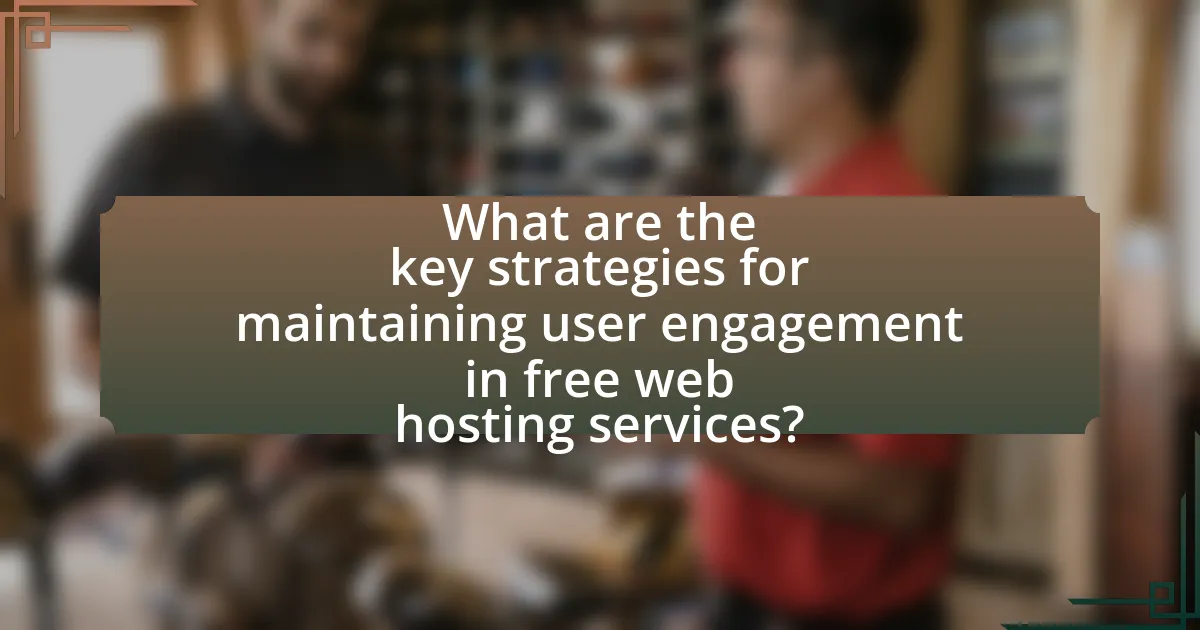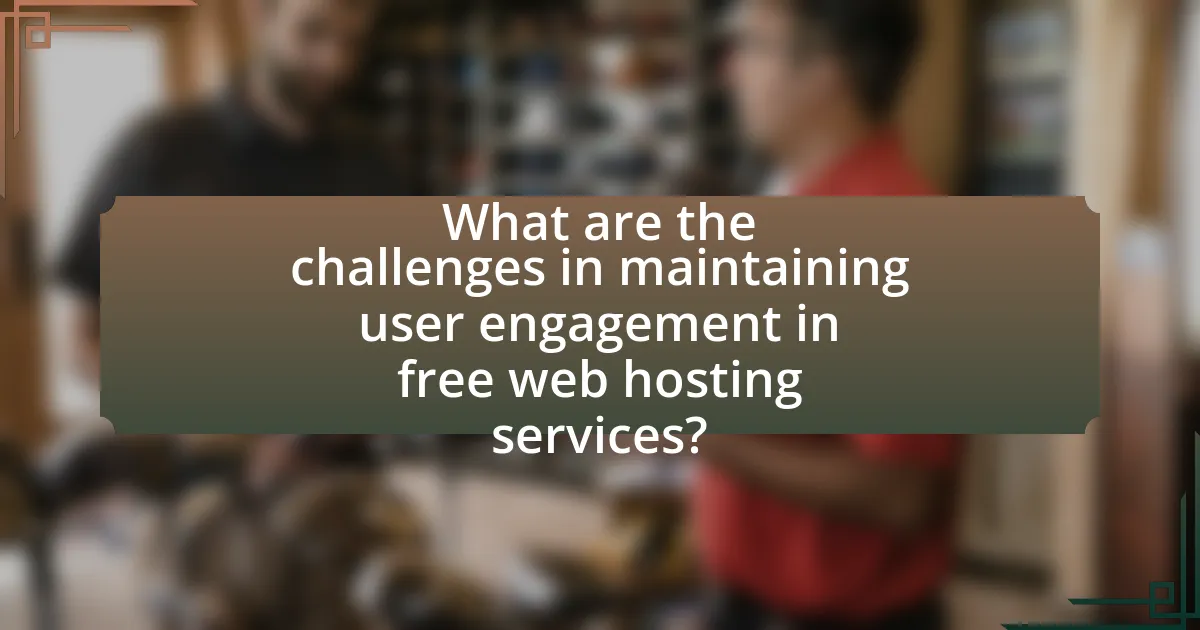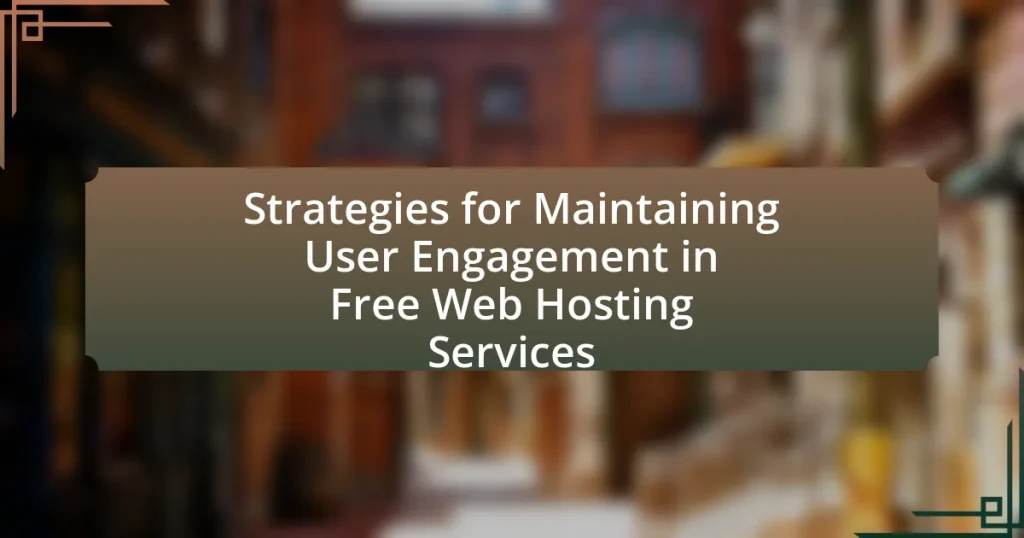The article focuses on strategies for maintaining user engagement in free web hosting services. It outlines key approaches such as ensuring reliable uptime, providing user-friendly interfaces, and implementing effective communication channels to enhance user satisfaction and retention. The discussion includes the influence of user needs and demographics on engagement strategies, the importance of user experience and website design, and the role of personalized communication and community building. Additionally, it addresses challenges providers face, common pitfalls in user engagement, and best practices for fostering loyalty and interaction among users.

What are the key strategies for maintaining user engagement in free web hosting services?
Key strategies for maintaining user engagement in free web hosting services include providing reliable uptime, offering user-friendly interfaces, and implementing effective communication channels. Reliable uptime ensures that users can access their websites without interruptions, which is crucial for retaining their interest and trust. A user-friendly interface simplifies the hosting experience, making it easier for users to manage their sites, thus encouraging continued use. Effective communication channels, such as responsive customer support and regular updates, foster a sense of community and keep users informed about new features or improvements, enhancing their overall experience. These strategies collectively contribute to higher user satisfaction and retention in the competitive landscape of free web hosting services.
How do user needs influence engagement strategies?
User needs significantly influence engagement strategies by dictating the features and services that providers prioritize to enhance user satisfaction. For instance, when users express a need for reliable uptime and customer support, engagement strategies may focus on improving server performance and offering 24/7 assistance. Research indicates that 70% of users are more likely to engage with services that meet their specific needs, highlighting the importance of tailoring strategies to user feedback and preferences. By aligning engagement strategies with user needs, providers can foster loyalty and increase retention rates in competitive markets like free web hosting services.
What specific needs do users have when using free web hosting services?
Users of free web hosting services primarily need reliable uptime, sufficient storage, and user-friendly interfaces. Reliable uptime ensures that their websites are accessible to visitors without interruptions, which is critical for maintaining engagement. Sufficient storage allows users to host their content without running into limitations that could hinder their website’s functionality. A user-friendly interface simplifies the process of website management, making it easier for users to update content and utilize features effectively. These needs are essential for users to successfully engage their audience and maintain an online presence.
How can understanding user demographics enhance engagement strategies?
Understanding user demographics enhances engagement strategies by allowing businesses to tailor their content and interactions to meet the specific needs and preferences of different user groups. For instance, research indicates that targeted marketing based on demographic data can increase engagement rates by up to 50%, as users are more likely to respond positively to content that resonates with their age, gender, location, and interests. By analyzing demographic information, companies can create personalized experiences, optimize communication channels, and improve overall user satisfaction, leading to higher retention rates in free web hosting services.
What role does user experience play in engagement?
User experience significantly influences engagement by determining how users interact with a platform. A positive user experience fosters satisfaction, leading to increased user retention and interaction frequency. Research indicates that 88% of online consumers are less likely to return to a site after a bad experience, highlighting the critical nature of user experience in maintaining engagement levels. Furthermore, effective user experience design can enhance usability, making it easier for users to navigate and utilize services, which directly correlates with higher engagement metrics.
How can website design impact user retention?
Website design significantly impacts user retention by influencing user experience, navigation ease, and overall satisfaction. A well-structured website with intuitive navigation encourages users to explore more content, leading to longer session durations and increased likelihood of return visits. Research indicates that 38% of users will stop engaging with a website if the content or layout is unattractive, highlighting the importance of aesthetic appeal in retaining users. Furthermore, responsive design ensures accessibility across devices, which is crucial as mobile traffic accounts for over 50% of global web traffic. Therefore, effective website design not only enhances user experience but also directly correlates with higher retention rates.
What features are essential for a positive user experience in free web hosting?
Essential features for a positive user experience in free web hosting include reliable uptime, user-friendly interfaces, adequate storage and bandwidth, and responsive customer support. Reliable uptime ensures that websites remain accessible, which is critical for user satisfaction; studies show that 99.9% uptime is the industry standard for quality hosting. User-friendly interfaces simplify the setup and management of websites, making it easier for users with varying technical skills to navigate the platform. Adequate storage and bandwidth prevent limitations on website growth and performance, with many free hosts offering at least 1GB of storage and sufficient bandwidth to accommodate small to medium traffic. Responsive customer support, ideally available through multiple channels, enhances user confidence and satisfaction, as timely assistance can resolve issues quickly, contributing to a better overall experience.
How can communication strategies enhance user engagement?
Communication strategies can enhance user engagement by fostering a two-way dialogue that encourages interaction and feedback. Effective communication strategies, such as personalized messaging and timely responses, create a sense of community and belonging among users. Research indicates that platforms employing targeted communication techniques see a 20% increase in user retention rates, as users feel more valued and understood. By utilizing data analytics to tailor messages and addressing user needs directly, organizations can significantly boost engagement levels, leading to higher satisfaction and loyalty.
What types of communication are most effective for engaging users?
Interactive communication methods, such as personalized emails, social media engagement, and live chat support, are most effective for engaging users. These methods foster a two-way dialogue, allowing users to feel heard and valued. For instance, personalized emails have been shown to increase open rates by 29% and click-through rates by 41%, according to a study by Campaign Monitor. Additionally, social media platforms enable real-time interaction, which can enhance user satisfaction and loyalty. Live chat support provides immediate assistance, improving user experience and retention rates.
How can feedback mechanisms improve user satisfaction?
Feedback mechanisms can significantly improve user satisfaction by enabling users to express their opinions and experiences, which in turn informs service providers about areas needing enhancement. When users provide feedback, it allows companies to identify specific pain points and preferences, leading to targeted improvements that align with user expectations. For instance, a study by the Nielsen Norman Group found that incorporating user feedback into product development can increase user satisfaction by up to 30%. This direct correlation demonstrates that actively listening to users and implementing their suggestions fosters a sense of value and engagement, ultimately enhancing their overall experience with the service.

What are the challenges in maintaining user engagement in free web hosting services?
Maintaining user engagement in free web hosting services is challenging due to limited resources, lack of personalized support, and competition from paid services. Free web hosting often provides minimal features and slower performance, which can lead to user frustration and decreased satisfaction. Additionally, the absence of dedicated customer service means users may struggle to resolve issues promptly, further diminishing their engagement. According to a study by HostingAdvice, 70% of users reported that slow loading times negatively impacted their experience, highlighting the importance of performance in user retention. Furthermore, the proliferation of paid hosting options with superior features creates a constant threat of user migration, making it difficult for free services to keep users engaged over time.
What common pitfalls do providers face in user engagement?
Providers face several common pitfalls in user engagement, including lack of personalized communication, inadequate user feedback mechanisms, and failure to deliver consistent value. Personalized communication is crucial; without it, users may feel disconnected and less inclined to engage. Inadequate feedback mechanisms prevent providers from understanding user needs and preferences, leading to missed opportunities for improvement. Additionally, if providers fail to consistently deliver value, users may lose interest and disengage. Research indicates that 70% of users are more likely to engage with services that offer personalized experiences, highlighting the importance of addressing these pitfalls.
How can lack of resources affect user engagement strategies?
Lack of resources can significantly hinder user engagement strategies by limiting the ability to create and maintain interactive and personalized experiences. When organizations face resource constraints, they often struggle to implement essential features such as responsive customer support, regular content updates, and effective marketing campaigns. For instance, a study by the Content Marketing Institute found that 63% of marketers cite a lack of time and resources as a primary barrier to effective content marketing, which directly impacts user engagement levels. Consequently, without adequate resources, organizations may fail to meet user expectations, leading to decreased satisfaction and higher churn rates.
What are the consequences of poor customer support on user retention?
Poor customer support significantly decreases user retention. When users encounter issues and receive inadequate assistance, their frustration often leads to dissatisfaction and a higher likelihood of abandoning the service. Research indicates that 70% of customers who experience poor service will switch to a competitor, highlighting the direct impact of support quality on user loyalty. Furthermore, a study by Microsoft found that 96% of customers who experience poor service do not return, underscoring the critical role of effective customer support in maintaining user engagement.
How do competitors influence user engagement strategies?
Competitors influence user engagement strategies by setting benchmarks for service quality, features, and user experience that other companies must meet or exceed. For instance, if a competitor introduces a new feature that significantly enhances user interaction, other companies in the same market may adopt similar or improved features to retain their user base. Research indicates that 70% of users are likely to switch services if they find a competitor offering better engagement tools, highlighting the direct impact of competitor actions on user retention strategies. Additionally, monitoring competitors’ marketing tactics can lead to the adoption of more effective communication strategies, as companies strive to capture the attention of users who may be swayed by rival offerings.
What strategies can be adopted to differentiate from competitors?
To differentiate from competitors in the free web hosting services market, companies can adopt strategies such as offering unique features, superior customer support, and targeted marketing. Unique features may include enhanced storage options, specialized tools for website building, or integrated SEO services that competitors do not provide. Superior customer support can be established through 24/7 availability, personalized assistance, and comprehensive knowledge bases, which can significantly improve user satisfaction and retention. Targeted marketing strategies, such as focusing on niche markets or specific user demographics, can also help in attracting users who feel underserved by existing offerings. These strategies are validated by market research indicating that companies with distinct value propositions and strong customer service outperform their competitors in user retention and satisfaction metrics.
How can market trends shape engagement approaches?
Market trends can significantly shape engagement approaches by influencing how businesses tailor their strategies to meet evolving consumer preferences and behaviors. For instance, the rise of mobile usage has led companies to prioritize mobile-friendly interfaces and responsive designs, enhancing user experience and engagement. Additionally, trends such as increased demand for personalized content drive businesses to utilize data analytics for targeted marketing, which has been shown to improve user retention rates. According to a report by McKinsey, companies that effectively leverage personalization can see a 10-30% increase in revenue, demonstrating the direct impact of market trends on engagement strategies.

What best practices can be implemented for effective user engagement?
Effective user engagement can be achieved through personalized communication, regular feedback loops, and community building. Personalized communication, such as tailored emails and content recommendations, increases user satisfaction and retention, as evidenced by a study from McKinsey, which found that personalization can lead to a 10-30% increase in revenue. Regular feedback loops, including surveys and user testing, allow users to feel valued and heard, fostering loyalty; research by UserTesting indicates that companies that prioritize user feedback see a 20% increase in customer satisfaction. Lastly, community building through forums and social media enhances user interaction and creates a sense of belonging, which is supported by data from the Community Roundtable, showing that engaged communities can lead to a 50% increase in user retention.
How can personalization enhance user engagement?
Personalization enhances user engagement by tailoring content and experiences to individual preferences and behaviors. When users receive customized recommendations, relevant notifications, and personalized interfaces, they are more likely to interact with the platform, leading to increased satisfaction and retention. Research indicates that 80% of consumers are more likely to make a purchase when brands offer personalized experiences, demonstrating the effectiveness of personalization in driving user engagement.
What tools can be used for personalizing user experiences?
Tools that can be used for personalizing user experiences include customer relationship management (CRM) systems, recommendation engines, and analytics platforms. CRM systems like Salesforce enable businesses to tailor interactions based on user data and preferences. Recommendation engines, such as those used by Amazon, analyze user behavior to suggest relevant products or content, enhancing engagement. Analytics platforms like Google Analytics provide insights into user behavior, allowing for targeted content and marketing strategies. These tools collectively enhance user experiences by delivering personalized content and interactions, which is crucial for maintaining engagement in free web hosting services.
How does targeted content improve user interaction?
Targeted content improves user interaction by delivering personalized experiences that resonate with individual user preferences and needs. This personalization increases engagement metrics, such as time spent on the site and interaction rates, as users are more likely to engage with content that is relevant to them. Research indicates that personalized content can lead to a 20% increase in user engagement, as users find tailored information more appealing and useful. By analyzing user behavior and preferences, platforms can create content that aligns with user interests, thereby fostering a more interactive and satisfying user experience.
What role does community building play in user engagement?
Community building significantly enhances user engagement by fostering a sense of belonging and connection among users. When users feel part of a community, they are more likely to participate actively, share experiences, and contribute content, which increases overall engagement levels. Research indicates that platforms with strong community features see a 30% increase in user retention rates, as users are motivated to return for social interactions and support. This connection not only encourages ongoing participation but also cultivates loyalty, making users more likely to recommend the service to others.
How can forums and user groups foster a sense of belonging?
Forums and user groups foster a sense of belonging by creating a community where individuals can share experiences, seek advice, and connect over common interests. This interaction builds relationships and encourages participation, as members feel valued and understood within the group. Research indicates that social support from peers in online communities enhances user engagement and satisfaction, leading to a stronger commitment to the group. For instance, a study published in the Journal of Computer-Mediated Communication found that users who actively participate in forums report higher levels of social connectedness and belonging, which reinforces their ongoing involvement in the community.
What are the benefits of hosting events or webinars for users?
Hosting events or webinars provides users with enhanced learning opportunities and community engagement. These interactive platforms allow users to gain knowledge from experts, ask questions in real-time, and participate in discussions, which fosters a sense of belonging and connection. Research indicates that 73% of participants in webinars report increased engagement with the hosting organization, demonstrating the effectiveness of these events in building user loyalty and satisfaction. Additionally, webinars can serve as a valuable resource for networking, enabling users to connect with peers and industry leaders, further enriching their experience.
What practical tips can be applied to maintain user engagement?
To maintain user engagement in free web hosting services, implement regular communication through newsletters and updates. This approach keeps users informed about new features, tips, and community events, fostering a sense of belonging. Additionally, offering interactive content such as tutorials, webinars, and forums encourages users to participate actively. Research indicates that platforms with high interactivity see a 30% increase in user retention rates. Lastly, providing personalized experiences through user feedback and tailored recommendations enhances satisfaction, leading to sustained engagement.
How can regular updates and improvements keep users interested?
Regular updates and improvements keep users interested by providing fresh content and features that enhance user experience. When web hosting services consistently roll out updates, they demonstrate a commitment to innovation and responsiveness to user feedback, which fosters user loyalty. For instance, a study by the Nielsen Norman Group found that users are more likely to engage with platforms that regularly introduce new functionalities, as this signals ongoing development and relevance. Additionally, updates can address bugs and performance issues, ensuring a smoother experience, which is crucial for retaining users in a competitive market.
What are effective ways to encourage user feedback and participation?
Effective ways to encourage user feedback and participation include implementing user-friendly feedback mechanisms, such as surveys and comment sections, and actively engaging with users through social media and community forums. Research shows that 70% of users are more likely to provide feedback when they feel their opinions are valued and acknowledged. Additionally, offering incentives, such as discounts or rewards for participation, can significantly increase user engagement. According to a study by the Nielsen Norman Group, users are more likely to participate when they see tangible benefits from their feedback, reinforcing the importance of creating a reciprocal relationship between the service provider and users.
